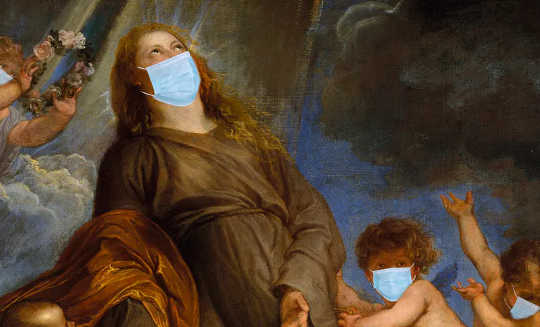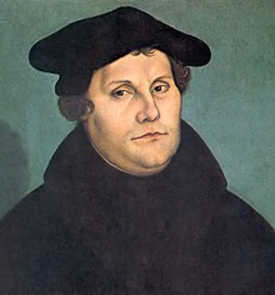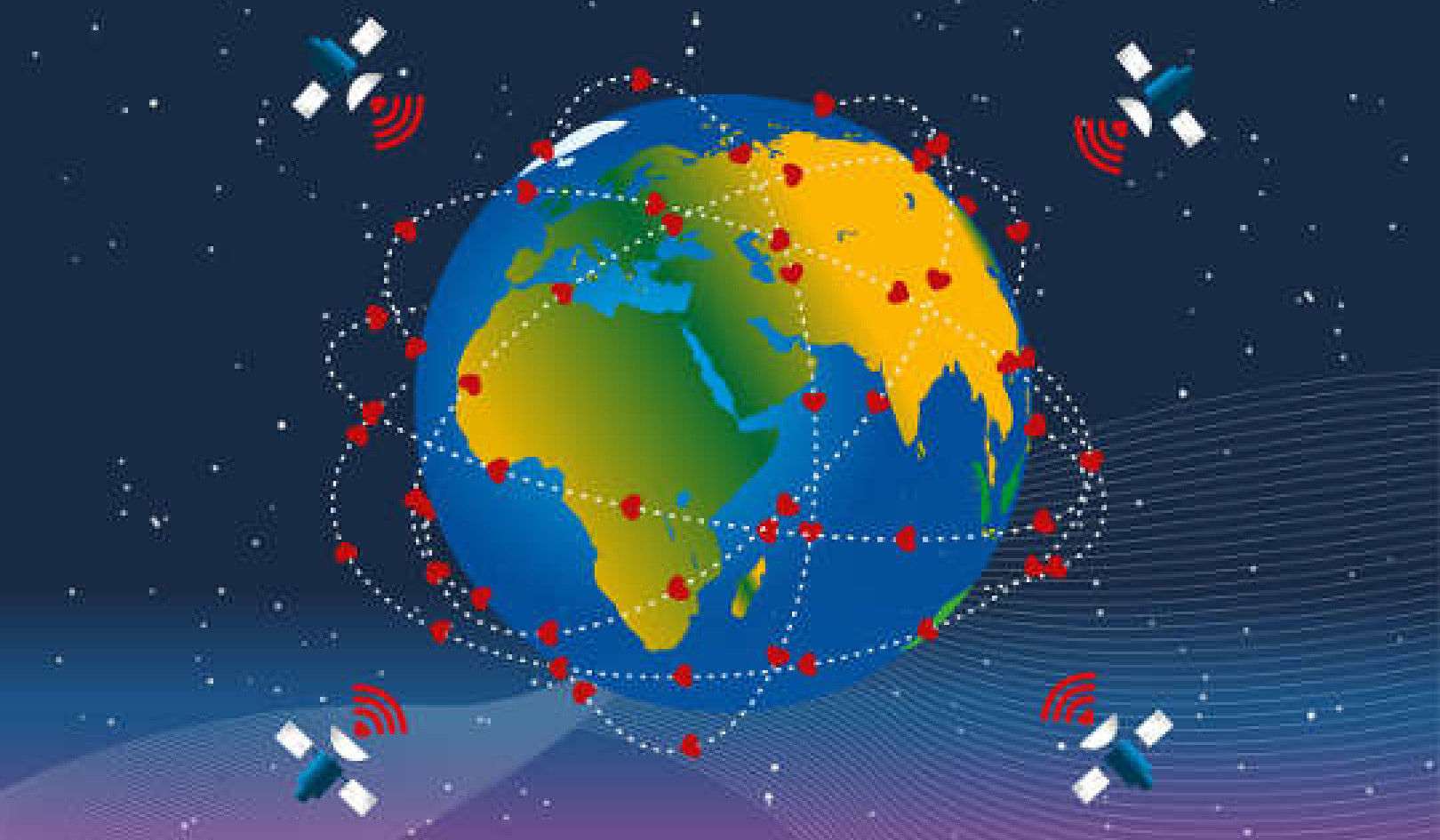
安東尼·範·戴克(Anthony Van Dyck)的聖羅莎莉(Saint Rosalie)為遭受巴勒莫(Palermo)瘟疫襲擊而代禱 /對話(道歉)
Most of us are living through a year that is unprecedented in our lifetimes.我們大多數人度過了有生以來史無前例的一年。 Too young to remember the Spanish flu, we've grown up in a world where we take Western wonder drugs and life-saving vaccines for granted.太年輕了,無法記住西班牙流感,我們已經成長為一個世界,在這個世界中,我們理所當然地接受了西方奇觀藥物和挽救生命的疫苗。 We have no memory of a time when disease brought the world to a standstill or shut down entire economies.我們不記得疾病使世界陷入癱瘓或關閉整個經濟的時期。 We could not have predicted life in Melbourne in 2020 would include a 5-kilometre travel limit or a curfew.我們無法預測XNUMX年墨爾本的生活將包括XNUMX公里的旅行限製或宵禁。
A longer view of history reminds us we are not the first community to experience and reflect on life during a time of plague or pandemic.對歷史的更長遠的回顧提醒我們,我們不是第一個在瘟疫或大流行時期經歷並反思生活的社區。 So what might we learn from history as we continue to navigate life during a pandemic?那麼,當我們繼續在大流行中度過生活時,我們可以從歷史中學到什麼呢?
我們要怪某人
Given the ubiquity of religion in most human communities throughout history, it is not surprising reflections on pandemics often begin with God.鑑於歷史上大多數人類社區普遍存在宗教信仰,因此對流行病的反思通常始於上帝,這一點不足為奇。 Plagues and diseases on such a scale feel “biblical” in the sense they are beyond the norm and therefore supernatural in some way.如此規模的鼠疫和疾病在某種意義上是“聖經的”,從某種意義上講它們超出了規範,因此是超自然的。 While modern science gives us insight into COVID-19, we still look for someone, anyone, to blame for its presence.儘管現代科學使我們對COVID-XNUMX有了深入的了解,但我們仍在尋找有人來指責它的存在。
在古代,有人經常是上帝。
One of the earliest records of plagues comes from the Hebrew Bible.瘟疫的最早記錄之一來自希伯來聖經。 Anyone who has celebrated Passover, read the biblical book of Exodus, or seen the animated Dreamworks movie Prince of Egypt will be familiar with the plagues that Moses (or God) unleashed on Egypt when Pharaoh would not free the enslaved Hebrews.任何慶祝逾越節,閱讀聖經記載的出埃及記,或看動畫的夢工廠電影《埃及王子》的人,都將熟悉摩西(或上帝)在法老王不會釋放被奴役的希伯來人時所遭受的災難。
{vembed Y=GJleW4TCQM0}
Not all of the plagues were disease, but they all brought destruction and potential death.並不是所有的瘟疫都是疾病,但是它們都帶來了破壞和潛在的死亡。 In that ancient narrative, a plague served two functions: it is divine punishment for injustice, and an assertion of religious power in the battle between Egypt's gods and the god of the Hebrews.在那個古老的敘述中,瘟疫起到了兩個作用:它是對不公的神聖懲罰,是在埃及眾神與希伯來神之間的戰鬥中宣稱的宗教權力。 In the Hebrew Bible texts, Pharaoh's refusal to release the slaves is to blame.在希伯來聖經文本中,法老拒絕釋放奴隸是罪魁禍首。 It is his fault.是他的錯
Throughout history, humans have sought explanations for things that are beyond our normal control or understanding.縱觀歷史,人類一直在尋求超出我們正常控製或理解範圍的事物的解釋。 While God is often credited as the sender of plagues or pestilence – usually to teach some moral lesson – we tend to focus our wrath on human scapegoats.雖然上帝通常被認為是瘟疫或瘟疫的發源者(通常是為了教一些道德課),但我們往往將憤怒集中在人類的替罪羊上。 In the 1980s, the HIV-AIDS viral pandemic was blamed on the gay community or在XNUMX年代,艾滋病毒/艾滋病病毒的大流行被歸咎於同性戀社區或 海地人,揭示了這種觀點背後的種族主義和同性戀恐懼症。
美國總統唐納德·特朗普(Donald Trump)始終將COVID-19稱為“中國病毒”反映了對替罪羊的類似渴望。 In its worst form, the blame game leads to在最壞的情況下,怪罪遊戲會導致 廣泛報應 反對與該團體相識的任何人。
政府的角色是保護社區的關鍵
Another link with the past is the role of government in containing disease.與過去的另一個聯繫是政府在控制疾病方面的作用。 Governments have for centuries used quarantine as a way to preserve public health, often with great success.幾個世紀以來,政府一直使用檢疫作為維護公共衛生的一種方式,通常取得了很大的成功。
然而,對強迫隔離的抵制也有著悠久的歷史,有報告稱這些隔離 被“不守規矩” 並且需要在 大瘟疫 in 17th-century England.在XNUMX世紀的英格蘭。 During this period, quarantine procedures在此期間,隔離程序 產生了明顯的變化 比較城市時的死亡率。
在整個社區的健康與個人自由之間取得平衡是一項艱鉅的任務。 凱倫·吉林斯 關於17世紀蘇格蘭瘟疫的社會歷史的研究表明,儘管醫生,治安法官和傳教士都將瘟疫視為超自然的(無論是直接來自上帝還是來自自然界的上帝),但信仰者的反應卻有所不同。
吉林斯描述 1603年,一位蘇格蘭傳教士因拒絕遵守政府的醫療措施而被捕,因為他認為這些措施毫無用處,因為這完全取決於上帝。 The preacher was imprisoned because he was viewed as dangerous: his individual freedoms and beliefs were deemed less important than the safety of the community as a whole.傳教士因被視為危險而入獄:他的個人自由和信仰被認為比整個社區的安全重要。
信奉宗教並不意味著反科學
但是,成為一個有信仰的人並不一定會構成一種反科學。
COVID懷疑論者在當代文化中具有多種形式,包括反宗教陰謀論者。 Yet anti-science views are often associated with people of faith thanks, in part, to some now然而,反科學的觀點常常與信仰者相關聯,這在某種程度上要歸功於現在的某些觀點。 悲慘 例子 來自北美。
 馬丁·路德(Martin Luther)照顧瘟疫中的垂死者。 Wikicommons
馬丁·路德(Martin Luther)照顧瘟疫中的垂死者。 Wikicommons
16世紀的神學家和改革家馬丁·路德(Martin Luther)是一個不相信理性的牧師的例子。 Luther wrote about living through the plague in a pamphlet titled路德(Luther)在一本名為“經歷瘟疫的生活”中寫道。 是否可能逃離致命的瘟疫.
牛津大學教授 琳達羅珀 writes that while many fled Wittenberg in 1527 when the plague struck, Luther stayed out of a sense of duty to help nurse and care for the dying.文章寫道,儘管XNUMX年鼠疫來襲時許多人逃離了維滕貝格,但路德沒有盡職盡責地為即將死去的人提供護理和護理。 This is what he thought all leaders should do.他認為這是所有領導人都應該做的。
His staying was not the decision of a martyr, nor was it born of a naïve idea that God would necessarily save or protect him.他的住所不是was道者的決定,也不是出於天真的想法,即上帝必然會拯救或保護他。 Luther,路德 羅珀寫道,“提倡社會疏遠”,使用醫院以及根據他所處時代的科學採取必要的預防措施。 While he believed that God was ultimately in control, he also affirmed human responsibility.在他相信上帝最終將控制一切的同時,他也確認了人類的責任。 Luther harshly condemned those who went about knowing they were sick and spreading the disease.路德嚴厲譴責那些知道自己生病並傳播疾病的人。
A historical perspective does not make living through a pandemic easy.歷史的觀點並不容易使人們度過大流行。 But perhaps there is a small comfort in realising we are not the first community to live through such times, and neither will we be the last.但是也許意識到我們不是經歷這種時代的第一個社區,我們也不是最後一個。
我們發現很難平衡的事情-個體自由與群體,問責制與責備,科學與個人信念-已有數百年曆史,並且具有深厚的人文底蘊。
而且,像幾個世紀以來的其他國家一樣,我們也有能力為病人和弱勢群體採取令人難以置信的關懷和犧牲行為。
關於作者
朝聖者神學院新約高級講師Robyn J. Whitaker, 神學大學

相關書籍:
女性祈禱日誌:52 周經文、靈修和引導祈禱日誌
Shannon Roberts 和 Paige Tate & Co.
這本書為女性提供了一本指導性的祈禱日誌,其中包含每週的經文閱讀、靈修提示和祈禱提示。
擺脫你的頭腦:停止有毒思想的漩渦
通過珍妮艾倫
這本書提供了克服消極和有毒思想的見解和策略,借鑒了聖經原則和個人經驗。
52 週的聖經:女性為期一年的聖經研究
金伯利·D·摩爾博士
這本書為女性提供為期一年的聖經學習計劃,包括每週閱讀和反思、學習問題和祈禱提示。
無情地消除匆忙:如何在現代世界的混亂中保持情緒健康和精神活力
約翰·馬克·科默
這本書借鑒了基督教的原則和實踐,提供了在忙碌而混亂的世界中尋找和平與目標的見解和策略。
以諾書
由 RH 查爾斯翻譯
這本書提供了一個被排除在聖經之外的古代宗教文本的新翻譯,提供了對早期猶太和基督教社區的信仰和實踐的見解。
























